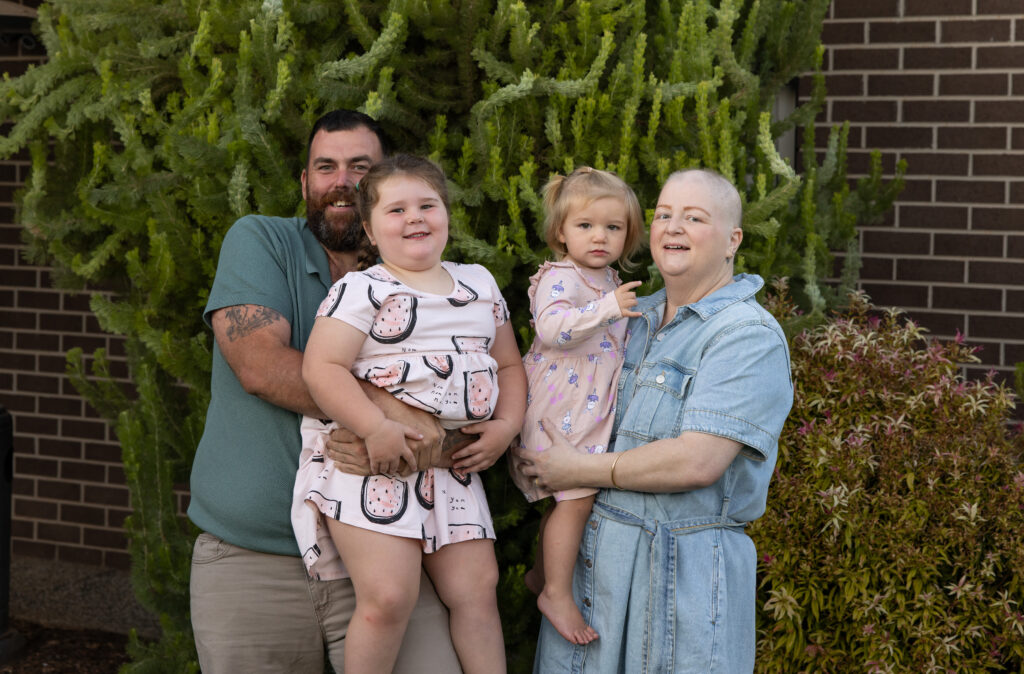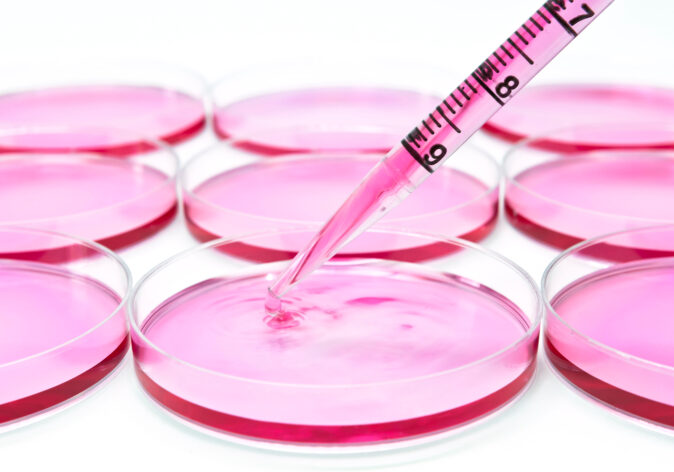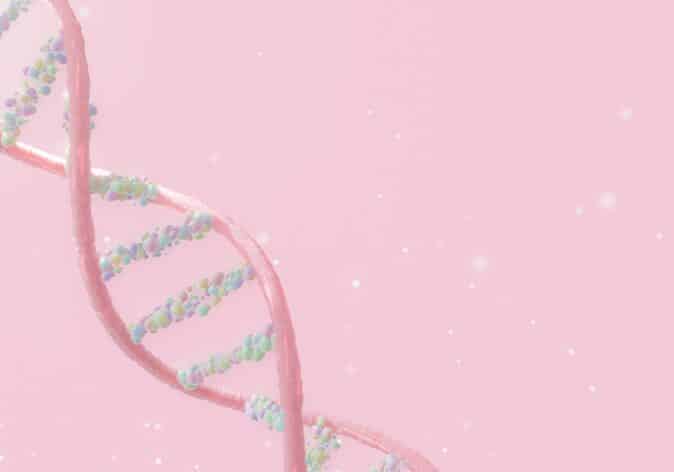“I’ve had a lot of IVF in the last couple of years, from 2020 to 2022. And then we had Dottie, and we also had Daphne through that time as well. So, after I had Dottie things started to change for me physically, which I stupidly overlooked and decided it was just hormone related from so much IVF.”
“Leading up to the diagnosis, we were just finally medical free, like from IVF and everything, and I was working full time. The kids were happy, and I felt like we were coming into our boring 10 years of just raising a family and getting on with things. And I went to the doctors just to finally get my breast checked out and was diagnosed with breast cancer.”
“That first month that I was diagnosed where you are going through all the process of getting MRIs, biopsies, and trying to figure out what kind of cancer it is and if it had spread, it was pretty dark. It was emotional for me. I just shut down when, especially in a high-pressure situation like that.”
“So, I was concerned for me, and for my kids. It was hard because I wanted to be here to raise my kids. I wanted to see them grow up and I didn’t know if it had spread or not. Cancer is prevalent in our family, so I had hope. My mom had it 14 years ago and she’s still here and healthy and happy, so that was a good example.”
“But until you know that it hasn’t spread and it’s just a standard breast cancer, it’s not like your terminal or anything like that, just so much craziness goes in your head of what’s going to happen, how are you going to handle this, and everything like that.”
“And answers don’t come quick enough, but you know, everything has a process. So, you do have to just wait. So, each week we’d get another little piece of the puzzle for about four weeks until we did the PET scan, and I got the confirmation that it hadn’t spread. And around that time we got confirmation that it was only stage two. So very lucky, considering I felt like I’d probably had an issue for nearly a year.”
Listen to the Podcast
We spoke with mum of two, Rebecca Pickering about her breast cancer diagnosis, navigating breast cancer with a young family, and her participation on the OLIO clinical trial.
How did your family react when you told them about your breast cancer diagnosis?
“So, my parents were away at the time, they were overseas. They didn’t know that I was going through the tests and everything. It was good timing. My mum and I are very close, so she would’ve been onto it if she hadn’t been here. So, it was nice that I just got to kind of process it in the lead up.”
“As soon as I had the mammogram, and the ultrasound, I knew something was wrong. Living in a small local town, the man that did my ultrasound had done all my ultrasounds. Not that I believe he remembered me or anything, but he immediately said to me ‘make sure you follow up with your doctor’. And it’s not something that he normally would say in that way.”
“So, my doctor has been my doctor for 14 years, and you just get a rapport with someone in that kind of relationship. The way my doctor rang, I immediately knew. The results weren’t just over the phone like they normally would be if it was nothing.”
“When I saw him, he was nearly distraught that he had to tell me, because he was the one that told my mum as well, when she was diagnosed. My dad’s mum died of breast cancer when she was 38. So, he was quite like me, he just shut down and was essentially like ‘yep, let’s get on with this’, whereas my mum obviously broke down because she’s been through it and knew what I was about to head into.”
“My husband, Matt, was fine. He’s the same as me. Just a deer in headlights in this situation. Like, we’re just going to have to work through it. And obviously a lot of my family and friends were just devastated for me.”
“I have two daughters and six nieces, and now that I know I have the BRCA gene in our family, you know my brother has it, so his daughter possibly has it. My daughters possibly have it. Any research towards the OLIO trial will benefit them in future years, I’m certain of that.”
What has your treatment been like so far?
“There are great local people in Mildura, but my doctor had felt that the Peter MacCallum Cancer Centre had never failed him. So, he referred me there, and my mum also went through the Peter MacCallum Centre, so it was where I wanted to be. I had my first appointment with oncologist around the end of October or start of November 2024.”
“Immediately she knew that I might be interested in a clinical trial, because within five minutes of our first appointment, she mentioned the OLIO trial. So, I felt that the team thought I was a good candidate to be screened for the trial. Going back when I was diagnosed, I had promised myself I’ll do anything to fill my body full of whatever it needs, to get rid of cancer.”
“So, when my oncologist told me about the OLIO trial, I was all for it, as long as I got the same protocol. Because I didn’t know about trials. So how it works is, you get the same protocol as what everyone else gets and then some add-ons. So, we were keen straight away to get it done.”
“For participation in the trial, you had to get genetic testing for the BRCA gene. So, we did that, and I had to get a few blood tests to make sure my bloods were okay. That was a bit of an uphill battle. Some of my bloods weren’t coming back quite right at the end when we were so close to going on the trial. So, I just had to work on some blood tests and things like that, so we did all of that and I made the trial, which was good and the trial team are amazing.”
Why did you decide to participate in the OLIO clinical trial?
“When my mum had breast cancer 14 years ago, there was no mention of the BRCA gene. So, in 14 years we’ve come so far already that they’ve been able to recognise that this gene is a problem for young women. So, when I went in to see Dr Sophie, I went into that appointment ready to have a mastectomy because I thought that’s what everyone around me was getting done.”
“But for this trial, we needed to do chemotherapy first. So, the plan was to start chemotherapy, and I did four rounds of that and then 12 rounds of paclitaxel as well as, as part of the OLIO trial. It is a chemotherapy tablet. And I also got immunotherapy as well. So, we’re just coming to the end of that phase now, and I booked in for a mastectomy in May.”
“I feel lucky to be on the OLIO trial. The coordination behind the scenes from the team is great. It’s something I don’t have to think of. When I initially signed up for it, Dr Stephen Luen said to me that my life would now be organised by the ladies in the research team. And he was correct. Anything I needed, I would just go to that team, and they would organise it for me.”
“Especially appointment changes, because I live remotely, we’ve had to shuffle some appointments around, so I don’t have to come down to Melbourne as often. I asked the doctors the last time I was there if the OLIO trial and remote monitoring is open available through the Peter MacCallum Cancer Centre, or is it available everywhere? And they did say that it’ll hopefully start to be screened everywhere so that everyone will have the opportunity to be on this trial.”
“I’ve known a few people with breast cancer that are going through it, or at the end of it now, and we discuss our different experiences, and I nearly don’t discuss some of the things that I’m doing as part of my treatment, because I do feel like you get a heightened level of care being on a trial, which is great for me, but everyone deserves it, if they can be on a trial.”
“I have struggled so much with the side effects of chemotherapy, of the fatigue, the lack of motivation, the brain not functioning like it would normally do. I can normally make decisions very quickly. So anything to do with trials that are around treatment plans that may be improved, is so beneficial to anyone going through it.”
Why do you think ongoing research into breast cancer is important?
“So, I have a few reasons, which is that the survival rates are so much better now. When I talk to my oncologist team here, they say that the number of young women coming through is baffling and they’ve just noticed that trend that a lot of young women seem to be getting breast cancer.”
“So, for me, the trials are so important for the statistical rate, but also, it’s about the treatment plans for people. Anything where you don’t have to have chemotherapy or you don’t have to have the invasion of radiation or surgery is so good.”
There is a trial out at the moment, where they may not need chemotherapy (find out more about the OPTIMA clinical trial). So, to me that was important because chemotherapy has ruined me in a way that I never thought it would. I don’t know how people work with chemotherapy. I don’t know how they get through their life. I’ve worked full time and long hours for the last 10 years and I stopped working in December and honestly just lay on the couch most days.”
What are your plans for the future?
“In my mind I’ve got September as when I’m going to be clear of all this. I don’t know why it’s September. I have my surgery in May, and I don’t know if I’m having radiation yet. That’ll be decided after surgery. So, by September this year I hope to be finished with this. I know life will never go back to normal, like it used to be.”
“I think there’s always going to be that cloud over you, and that concern about breast cancer coming back. But what I’m looking forward to is being cleared, and what I fear is it coming back somewhere else, because I don’t want chemotherapy again. I’ll do it, but it’s tough.”
“What concerns me the most each day as I’ve been going through this, is my girls. Daphne is four. So, she knows something’s wrong. I’ve been in and out of hospital, I’m away getting treatment. I’m not working, which was a big part of our life was me working. She took a couple weeks to get used to me being home and then wanted to be home with me. She said to me yesterday that she hopes I’m sick forever because I’m home.”
“So, I do feel going forward, I need to be home more. It’s been something that’s played on my mind the whole time. You know, what do I want to learn from this and moving forward, how is our life going to look? And I do believe in time I’ll look at cutting back in my job and possibly seeing what else is around, in that avenue. So yes, it’s just been my family really.”



